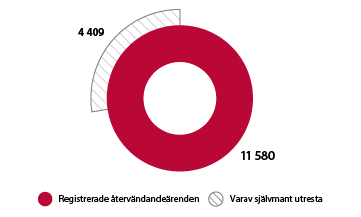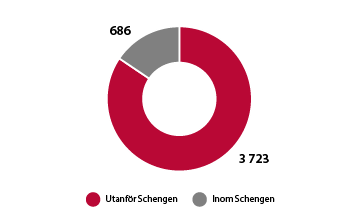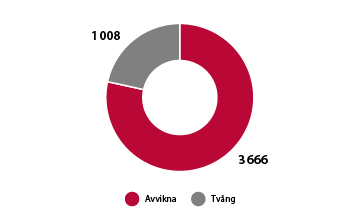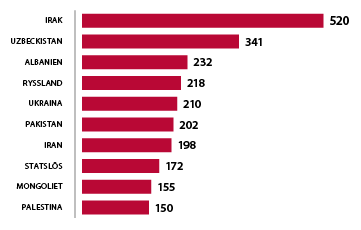The Swedish Migration Agency answers: how many people go back to their country of origin?
In this section of “The Swedish Migration Agency answers”, we highlight return and repatriation – two areas that are often confused but which are two completely different things.
What are the different ways in which people can return to their country of origin or be repatriated?
Let’s start by clarifying a first, fundamental question: what is the difference between return and repatriation?
In simple terms, returning is when a person has received a refusal of entry or expulsion decision, which means that they are obliged to leave Sweden and the Schengen area. If the person does not comply with the decision, the case can be handed over to the police. There can be two grounds for such a transfer; either coercion/force is needed to enforce the decision, or the person is hiding and a search must be conducted to find them. When the person in question has left the country or the case is handed over to the police for enforcement, the Swedish Migration Agency closes the return case. We explain the concept of enforcement further down.
Repatriation is when a person who has a valid residence permit chooses to leave Sweden and move back to their country of origin or to another country where the person has the right to stay.
What happens after the decision?
Depending on whether someone has received a refusal of entry or expulsion decision, they have different amounts of time to leave Sweden. In the case of refusal of entry, they have two weeks to leave. In the case of expulsion, they have four. If there are special grounds, they may be given a longer period of time to leave Sweden. The time starts counting down from the date on which the decision entered into legal force – i.e., as soon as it is no longer possible to lodge an appeal. The Swedish Migration Agency is responsible for holding return interviews with the returnee to provide support and information, e.g., about how the return will be carried out and how the agency can assist them.
Once a person with a return decision has travelled out of Sweden and the Schengen area, the decision is deemed to have been enforced – but just because the Swedish Migration Agency has made a refusal of entry or expulsion decision does not always mean that the agency can enforce it. In some cases, there may be no practical conditions for a person to be able to return to their country of origin. In particular, these are situations where:
- The person who must return is a child without a legal guardian, and it has been impossible to arrange for the child’s reception in their country of origin – in which case an expulsion may not be carried out even if such a decision has been made.
- The person does not wish to help with contribute to obtaining a travel document and the agency cannot help with it. The agency may be unable to assist in obtaining a travel document because there is insufficient information on the person in the case or because there is no re-admission agreement with the country in question: i.e., a structured cooperation agreement with the receiving country in the event of a return.
What can the Swedish Migration Agency do?
A common misconception is that the Swedish Migration Agency expels people by force (deports them). This is incorrect. The Swedish Migration Agency only works with voluntary returns and cannot force a person to return to their country of origin. On the other hand, the Swedish Migration Agency can decide to take a person into detention and then, if the person continues to refuse to comply with their return decision, the agency can hand over the case to the Swedish Police Authority, which has the right to use force if necessary. However, it is important to point out that enforcement must be implemented in as humane and legally secure a manner as possible.
Return support
In some cases, a person who has received a refusal of entry or expulsion decision and must return to their country of origin is entitled to financial support from the Swedish Migration Agency. This is called “reestablishment support” and aims to facilitate reestablishment in the person’s country of origin. Only nationals of certain countries – including Afghanistan, Eritrea, Iraq, Palestine and Somalia – are eligible for this aid.
The size of the reestablishment support depends on how old the applicant is – it is SEK 30,000 for those aged 18 and older and SEK 15,000 for minors. The support cannot exceed SEK 75,000 per family.
Repatriation support
In some cases, the Swedish Migration Agency can pay travel grants to people who want to be repatriated to their country of origin. It may do so if someone has a residence permit:
- as a refugee
- as a person in need of subsidiary protection
- on the grounds of exceptionally distressing circumstances, or
- as a quota refugee.
Anyone who wants to repatriate can receive a cash grant in addition to a grant for the actual journey. How much you can receive depends on how old you are and how many people are in your family. The agency grants a maximum of SEK 10,000 for each adult and SEK 5,000 for each underage child. A family cannot receive more than SEK 40,000 in cash.
A total of 33 applications for repatriation grants were received last year, of which two were granted.

In 2022, a total of 11,580 return cases were registered, the chart shows how many of these that have returned voluntarily.

All those who return do not depart according to their decision (to leave Schengen) but instead travel to another country within Schengen. The diagram shows how the distribution has looked for the return cases closed in 2022.

Return cases that were handed over to the police in 2022, either because force was needed or because the person was absconded.

Which citizenships were most common among those who returned voluntarily in 2022? The diagram shows the ten largest nationalities.
How many people returned in 2022
In 2022, 11,580 return cases were registered. A return case is registered by the Swedish Migration Agency as soon as the refusal of entry or expulsion decision becomes enforceable, which usually happens when it enters into legal force.
Of these 11,580 decisions, 4,409 individuals are currently registered as having voluntarily left the country – 3,723 people have travelled according to their decision and left Schengen, while the rest have travelled to another country within the Schengen area.
Over the past few years, the number of registered return cases has decreased; in 2020, 18,523 cases were registered, while in 2021, 13,782 were registered.
In terms of the number of people who have actually emigrated, the Swedish Migration Agency registered 6,800 voluntary returns in 2020 and 6,300 in 2021.
During the year, the Swedish Migration Agency handed 4,674 cases over to the police – 3,666 because the person had absconded and 1,008 because it was necessary to use coercion/force.
In 2022, Iraq, Uzbekistan, Albania, Russia and Ukraine accounted for the five largest citizenships for all voluntary emigration.
What’s next?
The Swedish Migration Agency has a number of mandates from the Government concerning return and repatriation. These issues will thus continue to be a focus throughout 2023.
Help increase voluntary returns
The Swedish Migration Agency must create the conditions for more voluntary returns among people who receive a refusal of entry or expulsion decision in their asylum or permit case. This also applies to people who receive a decision on refusal of entry with immediate effect – for example, because an asylum application is deemed to be manifestly unfounded and it is also obvious that a residence permit should not be granted on any other grounds.
Collaboration to streamline return work
Another mandate from the Government calls upon the Swedish Migration Agency, together with the Swedish Police Authority and the Swedish Tax Agency, to review how these authorities should work together to contribute to more effective return work.
The number of enforcements will increase by 50 per cent
The Swedish Migration Agency and the Swedish Police Authority have been tasked with jointly increasing the number of enforced refusal of entry and deportation decisions by 50 per cent in 2023 compared to 2021 – in numbers, that’s just under 9,000 people.
Increase knowledge to increase returns
The Swedish Migration Agency will provide more knowledge about what support is offered to people who return to their country of origin voluntarily – with the aim of getting more people to do so. To this end, a working group at the Swedish Migration Agency has been appointed to move forward with this new mandate.
A few of the figures in this text were updated after publication.